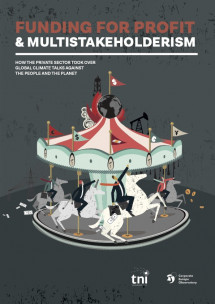Ideas into movement
Boost TNI's work
50 years. Hundreds of social struggles. Countless ideas turned into movement.
Support us as we celebrate our 50th anniversary in 2024.

In the light of the UN Climate Change Conferences (COP), this report unmasks where the multilateral system of global governance is being reshaped into a multistakeholder system that benefits private corporate capital. Furthermore, it unpacks some of the methods and mechanisms of multistakeholderism.

The corporate capture of the COP26 in Glasgow by the private finance sector is a manifestation of a major trend in how the multilateral system of global governance is being reshaped into one that benefits private corporate capital. The overall framing is of multistakeholderism. To arrive at this point has been a long and complex process both in the COP (the UN Conference of the Parties set up in Rio in 1992 with the responsibility of addressing climate change) and in the significant re- shaping of the overall UN multilateral system of global governance. This report unmasks some of the fronts where this corporate-centric takeover is occurring and its methods and mechanisms.
Part 1 describes how Big Finance was able to pull off a leadership coup at COP26 and identifies the multiple financial alliances (banks, investment corporations, asset owners, asset managers, financial services, insurance corporations) that emerged in Glasgow as the Global Financial Alliance for Net Zero (GFANZ). The GFANZ is an example of how multistakeholderism leads to corporate capture. Whereas it is supposedly embedded in a set-up with multiple stakeholders, such as academics and NGOs acting as experts or advisers who develop guidelines, in reality the finance corporations in GFANZ are in control. It is deeply troubling then, that the very investors funding pollution have been put in charge of handling the financial markets that are meant to tackle climate change.
Part 2 places these developments in the wider context where multistakeholderism is the major trend shaping global governance responses to all current global challenges at the UN level. It shows how this trend is visibly impacting climate negotiations, as the energy chapter illustrates.
The text concludes with indications on how governments and civil society need to respond at the COP27 – using their experiences of this engagement with multilateral bodies - to build strategies also for taking corporations out of the equation regarding the UN Summit of the Future scheduled for 2024.
Is an emerging global governance system that seeks to ‘bring together global actors that have a potential “stake” in an issue and ask them to collaboratively sort out a solution. It diverges from the international governance system, multilateralism, established at the end of World War I or World War II in which governments, as representative of their citizens, take the final decisions on global issues and direct international organizations to implement these decisions. In multistakeholderism ‘stakeholders’ become the central actors without any clear procedure to designate ‘stakeholders’ ... there are countless possible stakeholder categories and each of these categories can be disaggregated or aggregated, depending on decisions by the specific multistakeholder convenor.
Harris Gleckman, 2018.